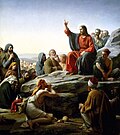| Part of a series on |
| Jewish Christianity |
|---|
 |
Ebionites (‹See Tfd›Greek: Ἐβιωναῖοι, translit. Ebiōnaîoi, derived from Hebrew אֶבְיוֹנִים,[1] ʾEḇyōnīm, meaning 'the poor' or 'poor ones') as a term refers to a Jewish Christian sect that existed during the early centuries of the Common Era,[2][3] whose name may have been taken from the first group of people mentioned in the Beatitudes of Jesus as blessed and meriting entry in the coming Kingdom of God on Earth.[4]
Since historical records by the Ebionites are scarce, fragmentary and disputed, much of what is known or conjectured about them derives from the polemics of their Gentile Christian opponents, specifically the Church Fathers — Irenaeus, Origen, Eusebius, and Epiphanius of Salamis — who saw the Ebionites as distinct from other Jewish Christian sects, such as the Nazarenes.[5][6][7][8]
The Church Fathers generally agree on key points about the Ebionites, such as their voluntary poverty and rejection of proto-orthodox Christian beliefs in Jesus' divinity, pre-existence, and virgin birth; they argue the Ebionites believed that Jesus was a mere man, born the natural son of Joseph and Mary, who, by virtue of his righteousness in perfectly following the Law of Moses, was adopted as the son of God to be a Messiah.[9]
According to these patristic sources, the Ebionites insisted on the necessity of following both the Law of Moses and the moral teachings of Jesus to be righteous; they revered James the Just as an exemplar of righteousness and the true successor to Jesus (rather than Peter), while rejecting Paul as a false apostle and an apostate from the Law.[10][11][12]: 88
However, the Church Fathers diverge on details regarding some specific Ebionite views about Jesus (the nature and mission of Christ), their use of additional scripture to the Hebrew Bible (one, some or all of the Jewish–Christian gospels), and their lifestyle practices (religious vegetarianism, ritual washing, etc.). These variations reflect the esoteric and evolving nature of early Christian sects, as well as the tendency of patristic polemicists to conflate different sects and misattribute unusual views and practices, more typical of Gnostic Christianity than Jewish Christianity, to Ebionites to discredit them.[13]: 39
Some modern critical scholars argue the Church Fathers' condemnation of Ebionites as "heretics" and "Judaizers" is both ironic and tragic, since many Ebionite views may have been closer to the authentic views of not only the first disciples of Jesus but also of the historical Jesus himself.[4][9]
- ^ Chisholm, Hugh, ed. (1911). . Encyclopædia Britannica. Vol. 8 (11th ed.). Cambridge University Press. p. 842.
- ^ "Ebionites". Encyclopædia Britannica. Retrieved 2022-11-14.
- ^ The Oxford Dictionary of the Christian Church. Oxford University Press. 2005. pp. 526–. ISBN 978-0-19-280290-3.
- ^ a b James D. Tabor (2006). The Jesus Dynasty: The Hidden History of Jesus, His Royal Family, and the Birth of Christianity. Simon & Schuster. ISBN 978-0-7432-8723-4.
- ^ A Companion to Second-Century Christian 'Heretics'. BRILL; 2008. ISBN 90-04-17038-3. p. 267–.
- ^ Klijn, AFJ; Reinink, GJ (1973). Patristic Evidence for Jewish-Christian Sects. Brill. ISBN 90-04-03763-2.
- ^ Hegg, Tim (2007). "The Virgin Birth — An Inquiry into the Biblical Doctrine" (PDF). TorahResource. Archived from the original (PDF) on 2007-08-21. Retrieved 13 August 2007.
- ^ Jeffrey Butz (2010). The Secret Legacy of Jesus. Inner Traditions. ISBN 978-1-59477-307-5. p. 124:
In fact, the Ebionites and the Nazarenes are one and the same
; p. 137: "Following the devastation of the Jewish War, the Nazarenes took refuge in Pella, a community in exile, where they lay in anxious wait with their fellow Jews. From this point on it is preferable to call them the Ebionites. There was no clear demarcation or formal transition from Nazarene to Ebionite; there was no sudden change of theology or Christology."; p. 137: "While the writings of later church fathers speak of Nazarenes and Ebionites as if they were different Jewish Christian groups, they are mistaken in that assessment. The Nazarenes and the Ebionites were one and the same group, but for clarity we will refer to the pre-70 group in Jerusalem as Nazarenes, and the post-70 group in Pella and elsewhere as Ebionites." - ^ a b Cite error: The named reference
Ehrman2005-lcwas invoked but never defined (see the help page). - ^ Kohler, Kaufmann (1901–1906). "EBIONITES (from = 'the poor')". In Singer, Isidore; Alder, Cyrus (eds.). Jewish Encyclopedia. Archived from the original on 2020-09-30. Retrieved 26 July 2020.
- ^ Hyam Maccoby (1987). The Mythmaker: Paul and the Invention of Christianity. HarperCollins. pp. 172–183. ISBN 0-06-250585-8, an abridgement.
- ^ Petri Luomanen (2007). Matt Jackson-McCabe (ed.). Jewish Christianity Reconsidered. Fortress Press. ISBN 978-0-8006-3865-8.
- ^ Cite error: The named reference
Pines1966was invoked but never defined (see the help page).